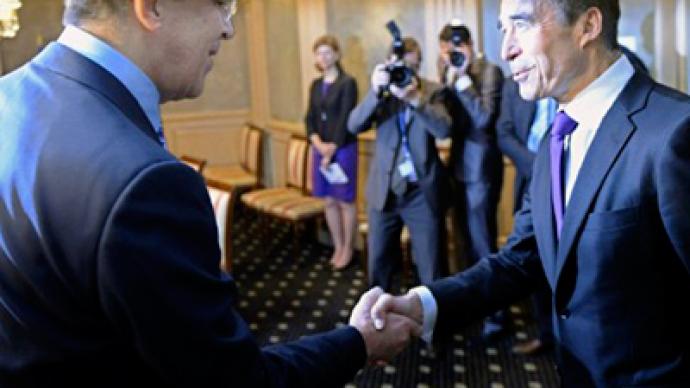Moscow calls for security partnership in Europe

Russia has called on NATO to renounce the policy of mutual deterrence and to switch to cooperation in the security field, Russian Foreign Minister Sergey Lavrov stated during a visiting session of the Russia-NATO Council in Sochi.
“Dialogue [on the AMD issue] is not going as fast as many had hoped after the Lisbon summit,” Russia’s foreign minister said during a media briefing on Monday after a meeting with NATO’s Secretary General Anders Fogh Rasmussen. “But dialogue continues on a bilateral basis, and today we specifically talked about what further opportunities Russia sees in this area.” Opening the meeting, Russian Foreign Minister Sergey Lavrov called on the alliance to switch from a policy of mutual deterrence to one of partnership in the security field.“Today we have the opportunity to support our common aim for a real strategic partnership which would open the way for positive interdependence between the Euro-Atlantic states as well as redirect those capabilities of mutual dependence so that we could jointly counter security threats,” Sergey Lavrov said. “The very fact of Russia’s hosting the visiting session of the Russia-NATO Council is an important signal for the public opinion of our countries,” he added.Summing up the results of the session later in the day, foreign minister Lavrov also said that Monday’s meeting of the Russia-NATO Council will “give additional impetus” to bilateral efforts “to reach mutually acceptable agreements on AMD”.He added that now, the main stumbling block in talks on the European AMD is the “sectarian approach” that is delimitating the zones of responsibility of all the countries which are to take part in the defense system.“Still we believe that there is a possibility to work jointly without creating additional risks or making agreements which would… undermine strategic stability,” the Russian foreign minister stressed. NATO’s chief demonstrated reserved optimism on the issue, though he did not go into specific details regarding the talks.“Today we heard speeches from the NATO side as well as from the Russian side that clarified certain key steps in the development of our plans, forces and means,” he said. “However, the sides still have many issues to resolve in this sphere. We cannot build a missile defense system in several months,” Rasmussen added.The main focus of Monday’s meeting centers around the implementation of agreements achieved during the Russia-NATO summit in Lisbon on November 20, 2010. At that time, Moscow and the alliance agreed to build a Russian-NATO partnership based on the principles of mutual trust, the indivisibility of security, transparency and predictability. During last November’s summit, President Medvedev stressed that the European anti-missile defense (AMD) project should be a tool for strengthening the security of all countries. He also pointed out that any unwillingness to take Russia’s interests into account in this domain could seriously harm Moscow-NATO relations. Russia considers US plans to deploy its anti-missile defense elements in Europe as a direct threat to its security. Medvedev repeatedly said that taking unilateral actions could lead to a new arms race. In his turn, NATO Secretary General Anders Fogh Rasmussen outlined the importance of common action to improve security.“Threats and challenges to the security of all 29 members of this Council are increasing. We know that none of us can deal with them successfully on our own. Because we have a major responsibility in building greater security and stability across the whole Euro-Atlantic area, we must work together,” he said in his opening remarks. Apart from the European AMD, the situations in Afghanistan and Libya were also high on the agenda during the meeting between the Russian foreign minister and NATO’s Secretary General on Monday morning.Summing up the results of the talks, Sergey Lavrov pointed out positive developments in Russia-NATO partnership in Afghanistan. “There is good progress regarding cooperation on Afghanistan, including the fight against drug trafficking, staff training, the supply of necessary equipment as well as arms to the Afghan army,” Lavrov commented. Turning to the Libyan problem, he noted:“Since NATO pledged to fulfill resolution 1973 of the UN Security Council on Libya, we exchanged opinions on how the norms of international law, including Security Council resolutions, are being observed during the operation code-named United Defender,” foreign minister Lavrov told journalists.Anders Fogh Rasmussen noted that all NATO actions in Libya comply with the UN decisions.“But we want this resolution to be complied without a hitch, without any additional interpretations. To be honest, we do not yet have a common view with NATO on how this resolution is to be implemented,” the Russian foreign minister added during a news conference after the day of talks.














